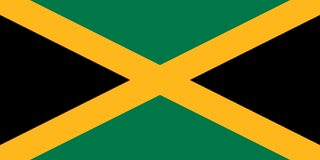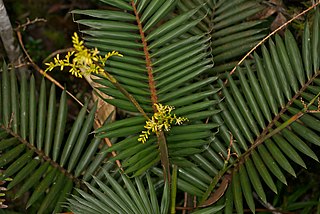Porgi grunt is an English common name used in Jamaica for several species of fish such as:

English is a West Germanic language that was first spoken in early medieval England and eventually became a global lingua franca. It is named after the Angles, one of the Germanic tribes that migrated to the area of Great Britain that later took their name, as England. Both names derive from Anglia, a peninsula in the Baltic Sea. The language is closely related to Frisian and Low Saxon, and its vocabulary has been significantly influenced by other Germanic languages, particularly Norse, and to a greater extent by Latin and French.

Jamaica is an island country situated in the Caribbean Sea. Spanning 10,990 square kilometres (4,240 sq mi) in area, it is the third-largest island of the Greater Antilles and the fourth-largest island country in the Caribbean. Jamaica lies about 145 kilometres (90 mi) south of Cuba, and 191 kilometres (119 mi) west of Hispaniola.
In biology, a species ( ) is the basic unit of classification and a taxonomic rank of an organism, as well as a unit of biodiversity. A species is often defined as the largest group of organisms in which any two individuals of the appropriate sexes or mating types can produce fertile offspring, typically by sexual reproduction. Other ways of defining species include their karyotype, DNA sequence, morphology, behaviour or ecological niche. In addition, paleontologists use the concept of the chronospecies since fossil reproduction cannot be examined. While these definitions may seem adequate, when looked at more closely they represent problematic species concepts. For example, the boundaries between closely related species become unclear with hybridisation, in a species complex of hundreds of similar microspecies, and in a ring species. Also, among organisms that reproduce only asexually, the concept of a reproductive species breaks down, and each clone is potentially a microspecies.
- Saucereye porgy (Calamus calamus)
- Jolthead porgy (Calamus bojanado)

The saucereye porgy is an ocean-going species of fish in the family Sparidae. In Bermuda, they are also known as the goat's head porgy. In Jamaica, they are known as the Porgi grunt and the sugareye porgy. They may also be known simply by the name Porgy in several other Caribbean islands. Saucereye porgies are considered to be minor gamefishes and when caught are marketed both fresh and frozen.

The jolthead porgy is an ocean-going species of fish in the family Sparidae. In Bermuda, it is known as the blue bone porgy, in the United States, it is also known by the Spanish name bojanado, in Jamaica, it is one of the species known by the name, porgi grunt.
| This page is an index of articles on animal species (or higher taxonomic groups) with the same common name (vernacular name). If an internal link led you here, you may wish to edit the linking article so that it links directly to the intended article. |









